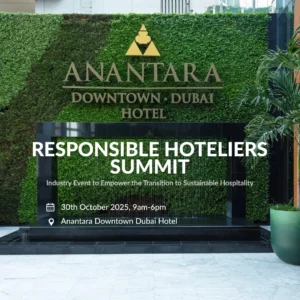In episode three of the webinar series on Sustainability, Sustainable Finance & ESG Reporting, sponsored by ADSA Hospitality Financial Consultants, we broaden our horizons and explore the connection between ESG Reporting and Sustainability in hospitality. Teaming up with an expert panel to deep-dive into the topic.
The panel includes some thought leaders and seasoned professionals in their respective industries.
- Iftikhar Hamdani, Area General Manager, HMH Hotel Group
- Damian Regan, Sustainability Reporting & Assurance Leader, Deloitte
- Radhika Arapally, Founder, Sustainability Kiosk
Here’s an outline of the agenda:
- Sustainability and net zero commitments
- Relevance of Sustainability for the accounting and finance community
- Sustainable Finance and incorporation of ESG in investment decisions
- Guidelines for ESG reporting
- Different initiatives by the hospitality industry
- Q&A
Defining Sustainability & Net Zero Commitments
The host, Rabia Shaukat, Managing Director, ADSA Hospitality Finance Consultants, started the discussion with a brief history of Sustainability. Our expert, Radhika Arapally, kicked off the session with a simple and concise definition of Sustainability and Net zero in layperson’s terms-
“Sustainability is fulfilling the current generation’s needs without compromising the needs of future generations while ensuring the balance between economic growth, environmental care, and social well-being.”
“Net zero entails cutting greenhouse gases to as close to zero as possible with the excess emission reabsorbed through the atmosphere, ocean, or forest.”
Radhika, Founder of Sustainability Kiosk. A marketplace offering buyers sustainable solutions, consultation, and education, highlights how hospitality has the leverage of the right resources, methodology, and tools to guide through the Net zero process.
Learn more from Sustainable Hospitality Alliance and Dr Prof. Wily Legrand’s recent publication, Sustainability in the Hospitality Industry.
Radhika reminded the audience of the question posed by Prof. Dr. Willy Legrand in episode 3 of the Sustainability Stories Podcast.
“Are We Being Good Ancestors?”
This crisp, one line-message is essential when looking at business solutions relating to Sustainability.
To join the conversation, click here; for the link to the Sustainable Hospitality Alliance interview with Claire Whitley, click here.
The Role of Sustainability in Finance and What is ESG?
Damian Regan from Deloitte sheds light on Sustainability and Finance. Companies and corporates can use disclosures and standard-setting bodies to enhance and align their procedures to corporate reporting.
Itthikar Hamdani, Area General Manager from HMH Hotel group, stressed the need for building a green team and various initiatives to grow the final GOP (gross operating profit). The discussion highlights different silos of the hotel operations while presenting how everyone, from staff to guests, can be aligned as a collective to achieve the company’s net “green” goal.
In Finance, as far as ESG (environment, social, and governance) is concerned, there is consensus that there needs to be more awareness. The “non-financial” information doesn’t get passed on with the same rigour as its contemporary.
Some expectations, challenges, and highlights for the industry to focus on:
- Growing Awareness and Leverage existing resources
- Understanding new types of data and updates
- Revamping audit procedures
- Identifying economic leakages and creating equitable opportunities
- Pathway to Net Zero by Sustainable Hospitality Alliance
Prioritising sustainable operations with a focus on the triple bottom line
- Clearly outlining targets in sync with the dynamics of the changing environment.
- Adopting procedures and practices that are consistent across the industry
- Making a solid case encouraging investors to step on the “green” side while outlining apparent commercial-profitable aspects
- Introducing green bonds and green loans
The primary goal is to decarbonise the industry by 2050
To learn more about decarbonisation and how we can achieve it, visit the link here.
It’s evident that when it comes to driving change of such magnitude, education and inclusivity are necessary. To be at the forefront, encouraging every individual at every level to do their part through guidance and science-backed inputs.
However, the global gender gap is one such factor that proves to be a hurdle in achieving “sustainable” change holistically. Radhika presented an astonishing figure. It would take 136 years to close the gender gap entirely, with only 8 per cent of women making it to top positions as they climb the corporate ladder.
In episode 22 of the Sustainability Stories podcast with Aradhana Khowala, CEO and founder of Aptamind Partners, we talk about gender equality with #BreakTheBias. Visit here for the podcast interview.
Conclusion
- Sustainability and ESG reporting at an individual operational entity level is still in its infancy.
- Important to draw a crisp and clear line between sustainable and “normal” investments to finally strike the optimal balance between financial and non-financial reporting.
- There are a lot of grey areas that still need to be entangled. However, one thing’s for sure– as rightly mentioned by Radhika, “Sustainability is addictive. Once you understand it and define your purpose, it never leaves you!”
For complete access to the discussion, click: https://www.youtube.com/watch?v=YaHFX_MJJJM&t=301s



